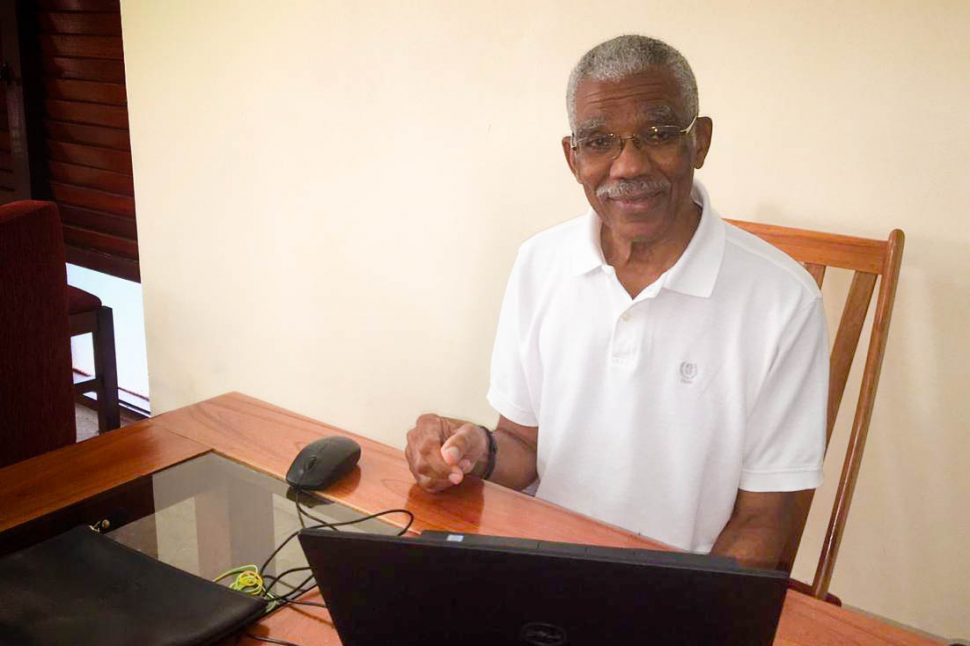Since taking up office in 2015, President David Granger has taken a total of 37 overseas trips at a total cost of over $209.4 million.
Except for four of them, the delegations for the trips were less than 10 persons, according to information provided to the National Assembly by Minister of State Joseph Harmon in response to questions asked by opposition Chief Whip Gail Teixeira.
Teixeira had asked for information on the number of trips taken by Granger between May 16th, 2015 and October, 2018 as well as the costs associated with those trips, including the size and members of the delegation.
In his written response, which was presented to the House, Harmon said that 37 overseas trips were completed by the president. In giving a breakdown, he said that during 2015, Granger completed 11 trips at a total cost of $57,534,300; in 2016, he completed eight overseas trips at a total cost of $44,773,029; in 2017, he completed eight overseas trips, costing $42,760,482; and up to the end of October this year, he completed ten overseas trips costing $64,431,261. The total cost of the 37 overseas trips is $209,499,223.20.
According to the breakdown, the president led delegations to New York, Barbados, Ethiopia, Brazil, Washington, Trinidad and Tobago, Paramaribo, Canada, Malta, Belize, Cuba, Morocco, Belgium, Grenada and Kenya.
According to the information provided by Harmon, the largest delegations comprised 12 persons. Those delegations went to the United Nations (UN), in New York, from September 20th to September 26th, 2016; and Grenada from July 4th to July 6th, 2017. Twice in 2015, the president led a 10-member delegation; from July 2nd to July 4th to Barbados, and from September 23rd to September 30th to New York.
On two occasions, the delegations comprised only the president and one other person and on 11 trips the delegation comprised the president and two others.
Although they were listed, the costs associated with a trip to Trinidad from October 21st to October 23rd and another to Cuba from October 30th to November 10th were not detailed.
Teixeira also asked Harmon to state the immediate and medium-term benefits to Guyana associated with each trip.
In response, the minister said, “Since taking office, H.E. President David Granger has attended several regional and international conferences as part of the government’s overall policy of advancing Guyana’s foreign policy objectives in respect of multilateral and specific bilateral issues at the highest level.”
In this respect, Harmon singled out the MERCOSUR Summit; the Commonwealth Heads of Government meetings; the CARICOM Heads of Government conferences; the meetings of the Heads of States and Government of the Association of Caribbean States; Union of South American (UNASUR) summits, summits of Latin American and Caribbean States; United Nations General Assembly meetings; and meetings of the Members of the International Solar Alliance.
Harmon stated that during the period identified the president also responded positively to the invitations of “our close friends and partners to undertake official and state visits.
“This has led to increased and heightened collaboration in several areas between Guyana and those countries and organizations,” he added.
With regards to Teixeira’s question on the actual benefits the country gained in 2018 from these trips, Harmon said that Guyana was able to bring issues of concern to the attention of the global community.
“Our interests were also taken into account in the outcome documents, especially those relating to the preservation of our sovereignty and territorial integrity, climate change, the 2030 development agenda among others. The President’s engagements with the United Nations Secretary General contributed to the decision to refer the longstanding border controversy with Venezuela to the International Court of Justice for final settlement,” he said.
According to Harmon, participation in the “high level” encounters provided the president with the opportunity to meet world leaders and to discuss ways to elevate bilateral cooperation programmes.
“As a consequence of these engagements, Guyana has received additional support for its Green State Development Strategy through funding for renewable energy projects,” he said before adding that several offers in the area of capacity building for Guyana’s emerging oil and gas sector from various countries were also received.
Further, Harmon disclosed that in 2018, Guyana became a founding member of the International Social Alliance (ISA) and will be benefiting from expertise, training and equipment as a result of its membership. This, he said, is in keeping with government’s focus on developing alternative sources of energy.
Trips, he noted, were made to the World Water Forum in Brasilia as well as the Global Environment Facility Assembly in Vietnam.
Noting that issues pertaining to Guyana were advanced, he said that “It must be recognized that Guyana, as a small member of the international community must ensure that it is represented and its voice heard, if it is to be respected and taken seriously.








